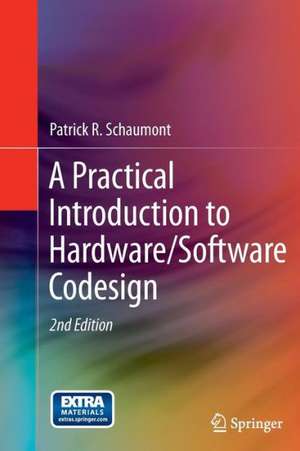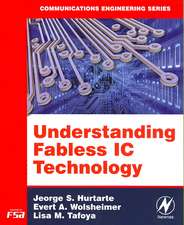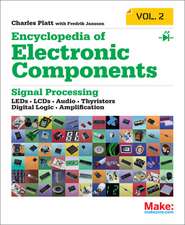A Practical Introduction to Hardware/Software Codesign
Autor Patrick R. Schaumonten Limba Engleză Paperback – 13 dec 2014
Improvements in this second edition include labs and examples using modern FPGA environments from Xilinx and Altera, which will make the material in this book applicable to a greater number of courses where these tools are already in use. More examples and exercises have been added throughout the book.
“If I were teaching a course on this subject, I would use this as a resource and text. If I were a student who wanted to learn codesign, I would look for a course that at least used a similar approach. If I were an engineer or engineering manager who wanted to learn more about codesign from a very practical perspective, I would read this book first before any other. When I first started learning about codesign as a practitioner, a book like this would have been the perfect introduction.”
--Grant Martin, Tensilica--
| Toate formatele și edițiile | Preț | Express |
|---|---|---|
| Paperback (1) | 594.10 lei 43-57 zile | |
| Springer Us – 13 dec 2014 | 594.10 lei 43-57 zile | |
| Hardback (1) | 742.61 lei 43-57 zile | |
| Springer Us – 21 noi 2012 | 742.61 lei 43-57 zile |
Preț: 594.10 lei
Preț vechi: 698.94 lei
-15% Nou
Puncte Express: 891
Preț estimativ în valută:
113.68€ • 118.99$ • 94.62£
113.68€ • 118.99$ • 94.62£
Carte tipărită la comandă
Livrare economică 31 martie-14 aprilie
Preluare comenzi: 021 569.72.76
Specificații
ISBN-13: 9781489990600
ISBN-10: 1489990607
Pagini: 504
Ilustrații: XXII, 482 p.
Dimensiuni: 155 x 235 x 26 mm
Greutate: 0.7 kg
Ediția:2nd ed. 2013
Editura: Springer Us
Colecția Springer
Locul publicării:New York, NY, United States
ISBN-10: 1489990607
Pagini: 504
Ilustrații: XXII, 482 p.
Dimensiuni: 155 x 235 x 26 mm
Greutate: 0.7 kg
Ediția:2nd ed. 2013
Editura: Springer Us
Colecția Springer
Locul publicării:New York, NY, United States
Public țintă
Upper undergraduateCuprins
The Nature of Hardware and Software.- Data Flow Modeling and Transformation.- Data FlowImplementation in Software and Hardware.- Analysis of Control Flow and Data Flow.- Final Statet Machine with Datapath.- Microprogrammed Architectures.- General-purpose Embedded Cores.- System On Chip.- Principles of Hardware/Software Communication.- On-chip Busses.- Microprocessor Interfaces.- Hardware Interfaces.- Trivium Crypto-Coprocessor.- AES Co-processor.- CORDIC Co-processor.-Hands-on Experiments in GEZEL.
Notă biografică
Patrick Schaumont is an Associate Professor in Computer Engineering at Virginia Tech.
Textul de pe ultima copertă
This textbook provides an introduction to embedded systems design, with emphasis on integration of custom hardware components with software. The key problem addressed in the book is the following: how can an embedded systems designer strike a balance between flexibility and efficiency? The book describes how combining hardware design with software design leads to a solution to this important computer engineering problem. The book covers four topics in hardware/software codesign: fundamentals, the design space of custom architectures, the hardware/software interface and application examples. The book comes with an associated design environment that helps the reader to perform experiments in hardware/software codesign. Each chapter also includes exercises and further reading suggestions.
Improvements in this second edition include labs and examples using modern FPGA environments from Xilinx and Altera, which make the material applicable to a greater number of courses where these tools are already in use. More examples and exercises have been added throughout the book and several chapters were expanded and reorganized.
“If I were teaching a course on this subject, I would use this as a resource and text. If I were a student who wanted to learn codesign, I would look for a course that at least used a similar approach. If I were an engineer or engineering manager who wanted to learn more about codesign from a very practical perspective, I would read this book first before any other. When I first started learning about codesign as a practitioner, a book like this would have been the perfect introduction.” --Grant Martin, Tensilica--
· Teaches embedded systems design, emphasizing the integration of custom hardware components with software.
· Presents the field ofhardware/software codesign in four parts: Basic Concepts, Custom Architecture, Hardware/Software Interfaces, and Applications;
· Incorporates labs and examples using modern FPGA environments from Xilinx and Altera.
Improvements in this second edition include labs and examples using modern FPGA environments from Xilinx and Altera, which make the material applicable to a greater number of courses where these tools are already in use. More examples and exercises have been added throughout the book and several chapters were expanded and reorganized.
“If I were teaching a course on this subject, I would use this as a resource and text. If I were a student who wanted to learn codesign, I would look for a course that at least used a similar approach. If I were an engineer or engineering manager who wanted to learn more about codesign from a very practical perspective, I would read this book first before any other. When I first started learning about codesign as a practitioner, a book like this would have been the perfect introduction.” --Grant Martin, Tensilica--
· Teaches embedded systems design, emphasizing the integration of custom hardware components with software.
· Presents the field ofhardware/software codesign in four parts: Basic Concepts, Custom Architecture, Hardware/Software Interfaces, and Applications;
· Incorporates labs and examples using modern FPGA environments from Xilinx and Altera.
Caracteristici
Provides proven textbook coverage of embedded systems design, emphasizing the integration of custom hardware components with software Presents the field of hardware/software codesign in four parts: Basic Concepts, Custom Architecture, Hardware/Software Interfaces, and Applications Uses examples and exercises that reflect real applications of embedded systems design Incorporates labs and examples using modern FPGA environments from Xilinx and Altera Includes supplementary material: sn.pub/extras
















